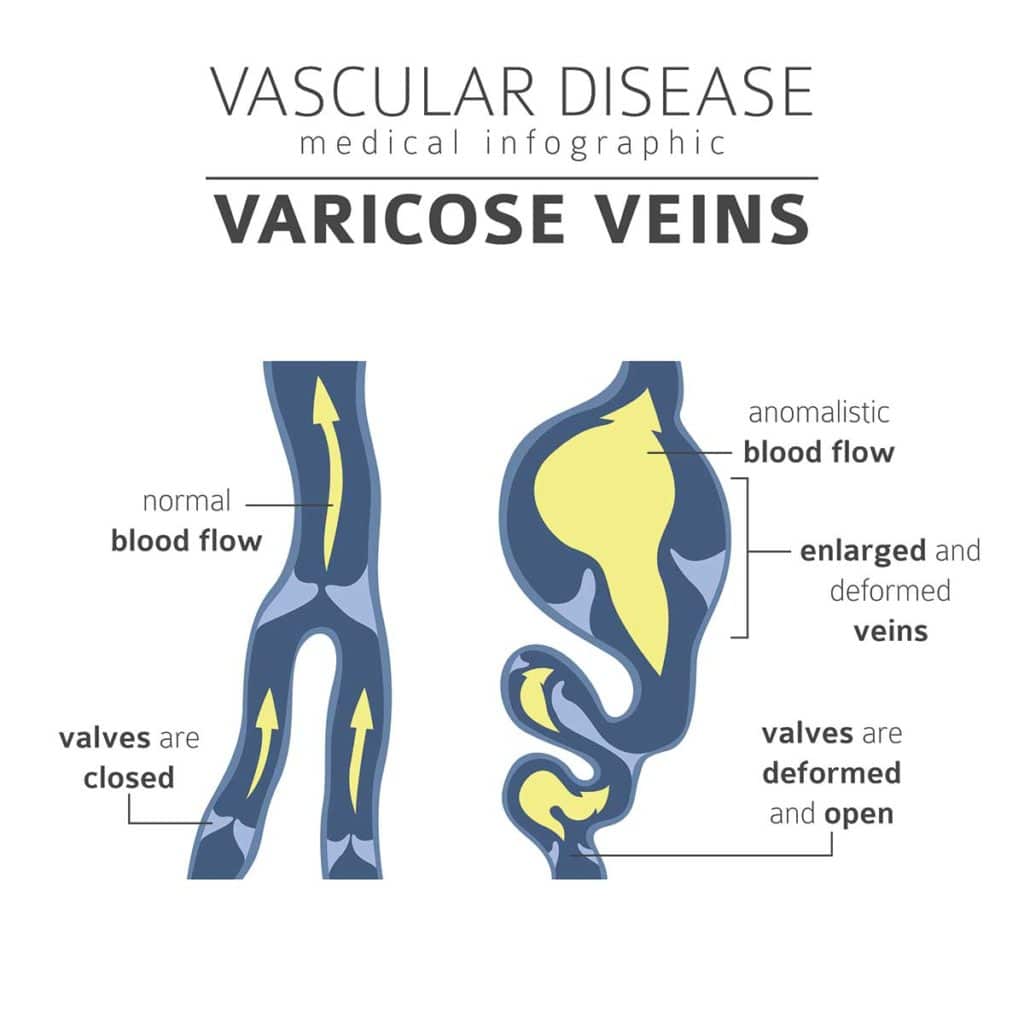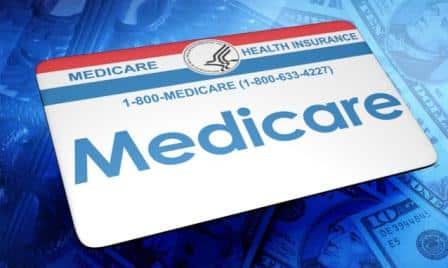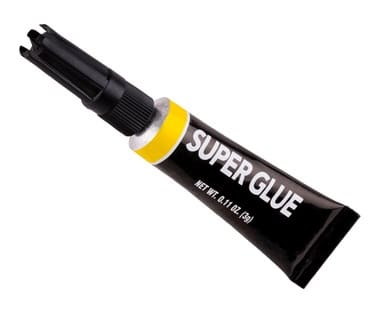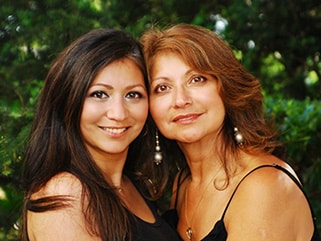Can Venous Insufficiency be Reversed?
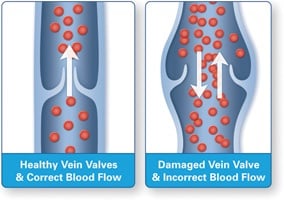
Can Chronic Venous Insufficiency (CVI) be reversed?
Unfortunately the short answer to this question is no; but CVI can be treated with minimally invasive procedures which can reduce symptoms and improve quality of life tremendously!
Chronic Vein Insufficiency Causes
In order to understand why venous insufficiency or peripheral venous insufficiency cannot be reversed, we must look at what causes venous disease. The most prevalent cause of venous insufficiency is genetics. A family history of vein disease is the biggest predictor of whether or not most people will develop vein problems. If a parent, grandparent, aunt, or uncle has or had problems with veins, it is likely that the reason you have developed them is purely genetic. Currently in medical research, there is no way to prevent this trait from being passed down the family tree.
Another venous insufficiency cause is hormones. Particularly in women, any shift in hormones; normal menstrual cycle, hormonal birth control, hormone replacement, menopause, and a combination of factors in pregnancy; cause the valves and walls of superficial veins to become weak. It is the weakness of these vein structures that cause the symptoms associated with venous insufficiency including: leg fatigue, leg heaviness, leg swelling, nighttime leg cramps, leg pain, restlessness of your legs, vein itching, itchy legs, prominent varicose veins, and spider veins.
Trauma is another cause of venous insufficiency. Although only a few cases of venous insufficiency can be linked to trauma alone, it is quite possible that a traumatic injury to the leg can cause enough damage that would affect the venous system.
Research has suggested that other health conditions may contribute to the weakening of the venous system including; lower extremity lymphedema, diabetes, obesity, smoking, hypertension, and arterial disease. However, direct correlations among these factors are still being researched, and current studies reveal conflicting results.
Regardless of which of the above venous insufficiency causes directly contribute to your specific venous condition, once the superficial veins are insufficient (weak); similar to a stretched out rubber band, there is not a way for these veins to regain their elasticity. It is the loss of elasticity or compliance that causes symptoms. These peripheral venous insufficiency symptoms become worse as time progresses and can be aggravated by things such as standing in one place (working as a hairstylist, teacher, cashier) and sitting for long periods of time (driving, desk jobs, flying in a plane). At night leg restlessness and leg cramping can wake people from sleep or make it difficult to fall asleep. Summertime heat can aggravate symptoms as it causes veins to become dilated and weaker.
Chronic Venous Insufficiency Treatment
Although there is no cure for venous insufficiency or venous disease, symptoms can be helped with compression stockings, exercise, cooler weather, leg elevation, and some homeopathic regimens. When these conservative methods no longer help, straight forward, minimally invasive procedures exist to alleviate the discomfort associated with venous insufficiency. These modern techniques cause little pain and fast recovery for the sufferer.
If you are experiencing leg fatigue, heaviness, swelling, night cramps, pain, restlessness, itching, prominent varicose or spider veins, have your legs evaluated by our qualified Vein Specialist to discuss appropriate treatment options for your specific case.
Question & Answer 5 weeks post-EVLT, veins along my inner thigh have turned brown, and one spot is slightly red. Is this normal? Question: It’s my 1st week in Vietnam and I’m here for an additional two-and-a-half weeks. My doctor closed up a vein in my groin area 5 weeks ago. I’ve just noticed on…
Read MoreQuestion: I am 20 years old with a history of undiagnosed autoimmune disease, which is currently in an acute flare. After suffering from a case of phlebitis in greater saphenous vein of the right leg for two months, I was just recently diagnosed with venous insufficiency in both the greater and smaller saphenous veins of…
Read MoreQ & A Pregunta: ¿Qué cubre el seguro, estoy en Medicare con un suplemento. Respuesta: Medicare con un suplemento cubre las visitas a la oficina, los ultrasonidos y las intervenciones necesarias, típicamente al 100%. Por lo general, no hay un gasto de bolsillo asociado con el tratamiento en la oficina.
Read MoreQ & A Question: What do insurance cover, I am on Medicare with a supplement. Answer: Medicare with a supplement covers the office visits, necessary ultrasounds and interventions, typically at 100%. Usually there is not an out of pocket expense associated with in-office treatment.
Read MoreQ & A Pregunta: ¿Cuál es el costo promedio si tiene varices en una pierna y arañas vasculares en la otra? Respuesta: la mayoría del tratamiento de las venas varicosas, si es médicamente necesario, está cubierto por el seguro. Los costes del tratamiento de la vena de la araña varían dependiendo de la cantidad de…
Read MoreQ & A Question: What is the average cost if you have varicose veins in one leg and spider veins in the other? Answer: Most varicose vein treatment, if medically necessary, is covered by insurance. Spider vein treatment costs vary depending on the amount of veins present, if the insurance will cover them (medically necessary) and…
Read MoreVenaSeal El último tratamiento para las varices puede parecer que es directamente de una película de ciencia ficción, pero la sustancia utilizada para cerrar las venas anormales, pegamento del cianocrilato, se ha utilizado en procedimientos médicos y cirugías por décadas. ¡ Créalo o no, el pegamento del cianocrilato se ha utilizado los procedimientos desde 1949,…
Read MoreVenaSeal The latest treatment for varicose veins may seem like it is straight out of a science fiction movie, but the substance used to close off abnormal veins, cyanoacrylate adhesive, has been used in medical procedures and surgeries for decades. Believe it or not, cyanoacrylate adhesive has been used procedures since 1949, and other types…
Read MoreAlgunos buenos consejos generales fueron recientemente compartidos por el Consejo de salud de Estados Unidos sobre varices y arañas vasculares. Hay algunos puntos adicionales que deben ser considerados cuando se discute la salud venosa. Con respecto a lo que hay que recordar; es importante mantener una hidratación adecuada. Al hacerlo, se fomentará un flujo sanguíneo…
Read MoreSome good general advice was recently shared by U.S. News Health Tip regarding varicose and spider veins. There are a few additional points that should be considered when discussing venous health. Regarding do’s and don’ts to remember; it is important to maintain adequate hydration. In doing so, one will encourage healthy adequate blood flow thereby…
Read More

